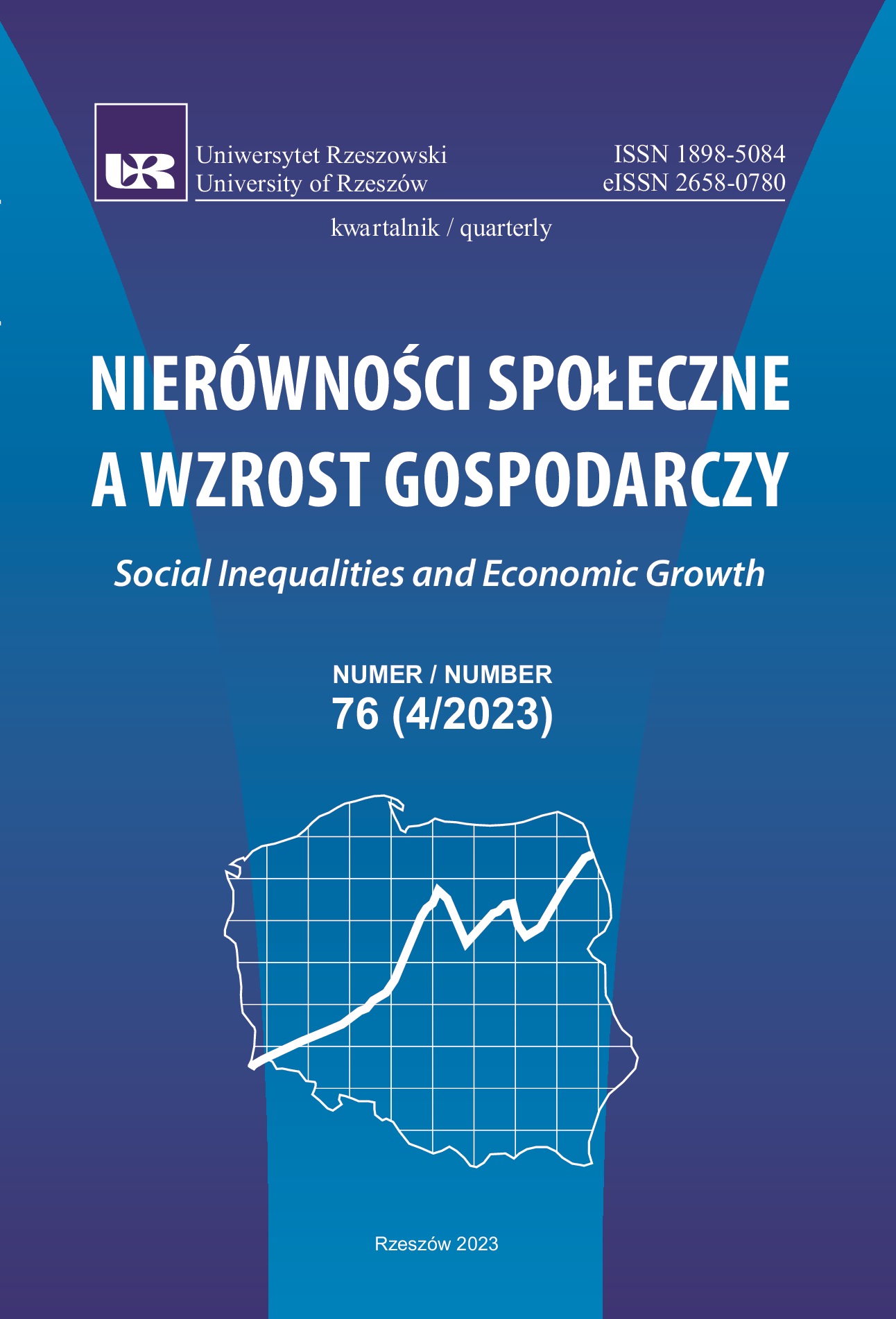Comparison of selected stages in the digitization of the accounting process in the era of COVID-19
DOI:
https://doi.org/10.15584/nsawg.2023.4.8Keywords:
financial e-reporting, digitization of accounting processes, act on accounting, tax law, auditAbstract
The aim of the article is to compare and characterize selected issues related to the digitization of accounting processes that chief accountants and other employees of accounting departments in general and accountancy companies face on a daily basis, as an expression of the need to smoothly define new phenomena in this area and an attempt to create a partial analysis of the most important consequences of the current legal status in Poland in this area. Due to the dynamic changes currently taking place in balance sheet law and tax law in Poland, special attention has been paid to the preparation, submission of e-financial statements and their examination in the era of the COVID-19 pandemic. The research hypothesis was verified, which assumed the existence of a cause-and-effect relationship between the choice of the method of identifying accounting data and the methodology of their presentation in the financial statements. To achieve this goal, it was necessary to use the following research methods: detailed analysis of the source materials of a balance nature and taxation as well as deductive and inductive methods.
Progressing digitalization has a huge impact on the shape of the accounting system. We have been dealing with the digitization of accounting for over two decades, but its significant advantages became especially visible during the COVID-19 pandemic. Today we are dealing with online accounting in the form of e-invoices, e-transfers, e-tax declarations, e-financial reports and other accounting documentation in an electronic form. The process of digitizing accounting documentation is an indispensable element of the accounting system, because the creation of information about an economic entity is carried out fully using IT systems, often very technologically advanced.
Implementing digital solutions in financial reporting is beneficial for the accounting community, entrepreneurs and public administration. This is another step in strengthening the perception of accounting as the information language of company management, thanks to universal access to free information on financial statements in an electronic form. Therefore, ensuring an efficient and transparent domestic accounting system is crucial from the point of view of economic development based on innovations, which are largely financed by this system.
Downloads
References
Aplikacja e-Sprawozdania Finansowe. Pobrane z: https://www.podatki.gov.pl/e-sprawozdania-finansowe/aplikacja/ (2022.07.22).
Białas-Szymańska, M. (2018). Efektywny rynek kapitałowy a system rachunkowości przedsiębiorstw. Kwartalnik Nauk o Przedsiębiorstwie, 49(4), 63–74. DOI: 10.5604/01.3001.0012.8121.
Chomuszko, M., Czauderna, I. Brząkowski, M. (2021). Podatkowe i bilansowe zamknięcie roku 2021, wyd. 1. Warszawa: C.H.Beck.
Dyrektywa Parlamentu Europejskiego i Rady 2017/1132 z dnia 14 czerwca 2017 roku w sprawie niektórych aspektów prawa spółek. (2022). Pobrane z: https://eur-lex.europa.eu/legal-content/PL/TXT/?uri=CELEX%3A32017L1132 (2022.07.20).
ESMA (2017). Final Report on the RTS on the European Single Electronic Format. Pobrane z: https://www.esma.europa.eu/sites/default/files/library/esma32-60-204_final_report_on_rts_on_esef.pdf (2022.07.22).
E-Sprawozdania Finansowe. Pobrane z: https://www.podatki.gov.pl/e-sprawozdania-finansowe/e-sprawozdania-finansowe/ (2022.07.22).
Grabiński, K., Kędzior, M. (2018). Forma prezentacji informacji w sprawozdaniach finansowych a ich użyteczność – przegląd wybranych badań. Zeszyty Naukowe Uniwersytetu Ekonomicznego w Krakowie 2(974), 41–59. DOI: 10.15678/znuek.2018.0974.0203.
Hass-Symotiuk, M. (2022). Rachunkowość finansowa przedsiębiorstwa. Warszawa: Wolters Kluwer.
Hołda, A. (2021). Instrukcje księgowe i podatkowe, wyd. 3, tom 1. Warszawa: C.H.Beck.
Krajowe Standardy Badania w brzmieniu Międzynarodowych Standardów Badania przyjęte przez KRBR do stosowania uchwałą nr 3430/52a/2019. Pobrane z: https://www.pibr.org.pl/assets/meta/4164,3430.Uchw.%20ws.%20KSB%20oraz%20innych%20okument%C3%B3w.pdf (2022.07.22).
Krajowy Standard Badania 570 – „Kontynuacja działalności”. 2020. Pobrane z: https://www.pibr.org.pl/assets/meta/7327,Proponowany%20MSB%20570%20(zmienio-ny%20202X)%20oraz%20zmiany%20dostosowawcze.pdf (2022.07.22).
Międzynarodowe Standardy Badania. (2019). (ang. International Standards on Auditing – ISAs) – KSRF 200: Krajowy Standard Rewizji Finansowej 200 w brzmieniu Międzynarodowego Standardu Badania 200 (IAASB). Pobrane z: https://www.pibr.org.pl/assets/file/4169,1.1%20KSB%20200.pdf (2022.07.22).
Pfaff, J. (2022). Rachunkowość finansowa z uwzględnieniem MSSF. Warszawa: Państwowe Wydawnictwo Naukowe.
Remlein, M. (2021). Sprawozdanie finansowe jednostek prowadzących działalność gospodarczą (eBook). Poznań: Uniwersytet Ekonomiczny w Poznaniu.
Ustawa z dnia 10 października 1999 r. Kodeks karny skarbowy (Dz.U. z 2018 r. poz. 1958 ze zm.).
Ustawa z dnia 11.03.2004 r. o podatku od towarów i usług (Dz.U. z 2022 r. poz. 931).
Ustawa z dnia 15 lutego 1992 r. o podatku dochodowym od osób prawnych (Dz.U. z 2019 poz. 865 ze zm.).
Ustawa z dnia 20 sierpnia 1997 r. o Krajowym Rejestrze Sądowym (Dz.U. z 2019 r. poz. 1500 ze zm.).
Ustawa z dnia 26 lipca 1991 r. o podatku dochodowym od osób fizycznych (Dz.U. z 2019 poz. 1387 ze zm.).
Ustawa z dnia 29 września 1994 r. o rachunkowości (Dz.U. z 2019 r. poz. 351 ze zm.).
Ustawa z dnia 29.09.1994 r. o rachunkowości (Dz.U. z 2020 r. poz. 568).
Ustawa z dnia 29.09.1994 r. o rachunkowości (Dz. U. z 2021 r. poz. 2106).
Walińska, E. (2016). MERITUM Rachunkowość. Rachunkowość i sprawozdawczość finansowa (eBook). Warszawa: Wolters Kluwer Polska SA.
Wójtowicz, T. (2015). Aspekty praktyczne użyteczności sprawozdań finansowych. Zeszyty Teoretyczne Rachunkowości, 82(138), 160–188. DOI:10.5604/16414381.1155823.
Wpływ pandemii koronawirusa SARS-Cov-2 na badanie sprawozdań finansowych za 2019 rok. 2020. Pobrane z: https://www.pibr.org.pl/assets/meta/5142,Alert%20dla%20BR%20ws%20koronawirusa_fin.pdf (2022.07.22).
Downloads
Published
How to Cite
Issue
Section
License
Copyright (c) 2023 University of Rzeszow

This work is licensed under a Creative Commons Attribution-ShareAlike 4.0 International License.


